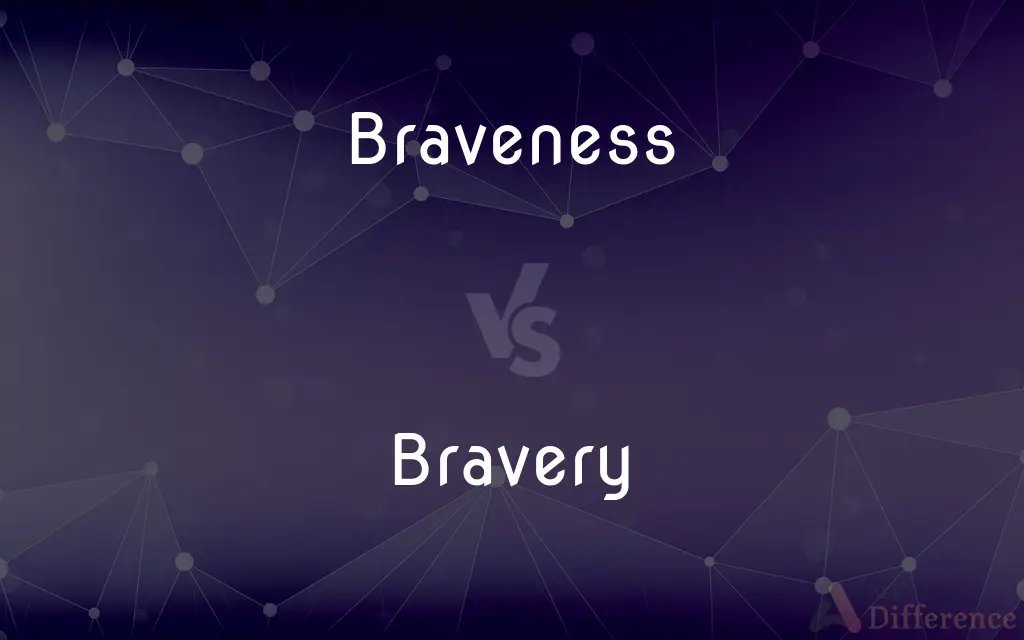Braveness vs. Bravery — What's the Difference?
By Tayyaba Rehman & Maham Liaqat — Updated on March 29, 2024
Braveness and bravery both describe the quality of being courageous, but bravery is the more commonly used term and is often associated with a wider range of contexts, including valor and heroism.

Difference Between Braveness and Bravery
Table of Contents
ADVERTISEMENT
Key Differences
Braveness and bravery both encapsulate the concept of courage and the ability to confront fear, danger, or adversity. However, the term "bravery" is preferred in most contexts and carries connotations of exceptional courage or valor, often used to describe acts of heroism or enduring challenging situations with fortitude. While "braveness" is understood and occasionally used, it is less common and tends to be employed in more everyday contexts, without the historical or literary weight that bravery possesses.
The distinction between braveness and bravery can be subtle, as both qualities are admired and sought after in individuals facing difficult circumstances. Bravery is frequently associated with a noble quality, highlighting the admirable nature of facing and overcoming fears in extraordinary situations. On the other hand, braveness might be seen as a more straightforward expression of courage, possibly lacking the depth or gravitas typically implied by bravery.
In literature and historical accounts, bravery is often highlighted as a virtue of significant characters or real-life heroes, suggesting a level of heroism or valor above the ordinary. Braveness, while also positive, does not carry the same traditional or cultural resonance, making it less likely to be used in formal or elevated discourse.
Bravery is a term that can encapsulate a wide array of actions and characteristics, ranging from physical courage in the face of danger to moral courage in standing up for what is right. Braveness, capturing a similar range, might not evoke the same richness of context or implication of valor and virtue.
Both braveness and bravery are qualities that can be cultivated and demonstrated in various aspects of life, from personal challenges to public endeavors. The choice between the two terms often comes down to the speaker's preference or the specific nuances they wish to convey, with bravery being the more universally recognized and celebrated expression of courage.
ADVERTISEMENT
Comparison Chart
Common Usage
Less common, everyday courage
Widely used, associated with valor and heroism
Connotations
Straightforward courage
Exceptional courage, valor, heroism
Context
More everyday situations
Broad range of contexts, including noble acts
Cultural Resonance
Less historically or culturally resonant
Strong historical and cultural resonance
Implication
Basic expression of courage
Suggests a higher level of virtue and nobility
Compare with Definitions
Braveness
A straightforward expression of courage.
He showed braveness by facing his fears.
Bravery
The quality of being heroic or showing valor.
His bravery on the battlefield earned him several honors.
Braveness
The quality of being courageous in everyday situations.
Her braveness in standing up to bullies was admirable.
Bravery
The virtue of facing and overcoming fear, danger, or adversity.
Bravery is not only about physical challenges but also moral ones.
Braveness
The state of being brave on a personal level.
The child's braveness during the medical procedure was inspiring.
Bravery
A noble quality associated with heroism.
She was celebrated for her bravery in standing up for justice.
Braveness
The capacity to confront fear or adversity.
Braveness isn’t the absence of fear, but the will to overcome it.
Bravery
The capacity to endure challenging situations with fortitude.
Their bravery in the face of adversity was a beacon of hope for others.
Braveness
Demonstrating courage in actions or decisions.
Her braveness in making a difficult decision was respected by her peers.
Bravery
Exceptional courage, especially in challenging or dangerous situations.
The firefighter's bravery saved lives during the fire.
Braveness
Possessing or displaying courage.
Bravery
The condition or quality of being brave; courage.
Braveness
Making a fine display; impressive or showy
“a coat of brave red lipstick on a mouth so wrinkled that it didn't even have a clear outline” (Anne Tyler).
Bravery
Splendor or magnificence; show.
Braveness
Excellent; great
“The Romans were like brothers / In the brave days of old” (Thomas Macaulay).
Bravery
Being brave, courageousness.
Braveness
(used with a pl. verb) People who exhibit bravery or courage considered as a group
“O'er the land of the free / And the home of the brave” (Francis Scott Key).
Bravery
(countable) A brave act.
Braveness
(Offensive) A Native American warrior.
Bravery
Splendor, magnificence.
Braveness
(Archaic) A bully.
Bravery
The quality of being brave; fearless; intrepidity.
Remember, sir, my liege, . . . The natural bravery of your isle.
Braveness
To endure or face courageously
“He remained in his tent on inclement mornings while others in the party braved the rain ... looking for birds” (Bert O. States). “Together they would brave Satan and all his legions” (Emily Brontë).
Bravery
The act of braving; defiance; bravado.
Reform, then, without bravery or scandal of former times and persons.
Braveness
(Obsolete) To make showy or splendid.
Bravery
Splendor; magnificence; showy appearance; ostentation; fine dress.
With scarfs and fans and double change of bravery.
Like a stately ship . . . With all her bravery on, and tackle trim.
Braveness
To make a courageous show or put up a stalwart front.
Bravery
A showy person; a fine gentleman; a beau.
A man that is the bravery of his age.
Braveness
The characteristic of being brave.
Bravery
A quality of spirit that enables you to face danger of pain without showing fear
Braveness
The quality of state or being brave.
Bravery
Feeling no fear
Common Curiosities
Are braveness and bravery the same?
While both terms relate to courage, bravery is more commonly used and often implies a greater level of heroism or valor.
When should I use braveness instead of bravery?
Braveness can be used in more everyday contexts, but the choice largely depends on personal preference or the specific nuances desired.
Can braveness be used to describe heroic acts?
Yes, braveness can describe heroic acts, though bravery is more typically employed in such contexts due to its connotations of exceptional courage.
How are braveness and bravery portrayed in literature?
In literature, bravery is often a central theme, portraying characters who face great odds with courage, while braveness may be depicted in more personal or subtle challenges.
Is bravery only physical?
No, bravery encompasses both physical and moral courage, including standing up for what is right, despite personal risk or opposition.
Can animals exhibit braveness or bravery?
While these terms are typically used to describe human qualities, animals can exhibit behaviors that humans might interpret as brave or courageous.
How can someone show bravery in daily life?
Bravery in daily life can be shown by facing personal fears, overcoming challenges, standing up for others, or making difficult decisions with integrity.
Do cultural perceptions of braveness and bravery differ?
Yes, cultural perceptions can differ, with bravery often carrying more weight and historical significance in various cultures.
Is bravery a natural trait or can it be developed?
While some may naturally exhibit bravery, it is a quality that can be cultivated through experience, reflection, and consciously facing fears.
Why is bravery valued in society?
Bravery is valued for its association with heroism, virtue, and the ability to face and overcome adversity, inspiring others and contributing to the greater good.
Share Your Discovery

Previous Comparison
Pinion vs. Wing
Next Comparison
Terror vs. FearAuthor Spotlight
Written by
Tayyaba RehmanTayyaba Rehman is a distinguished writer, currently serving as a primary contributor to askdifference.com. As a researcher in semantics and etymology, Tayyaba's passion for the complexity of languages and their distinctions has found a perfect home on the platform. Tayyaba delves into the intricacies of language, distinguishing between commonly confused words and phrases, thereby providing clarity for readers worldwide.
Co-written by
Maham Liaqat















































